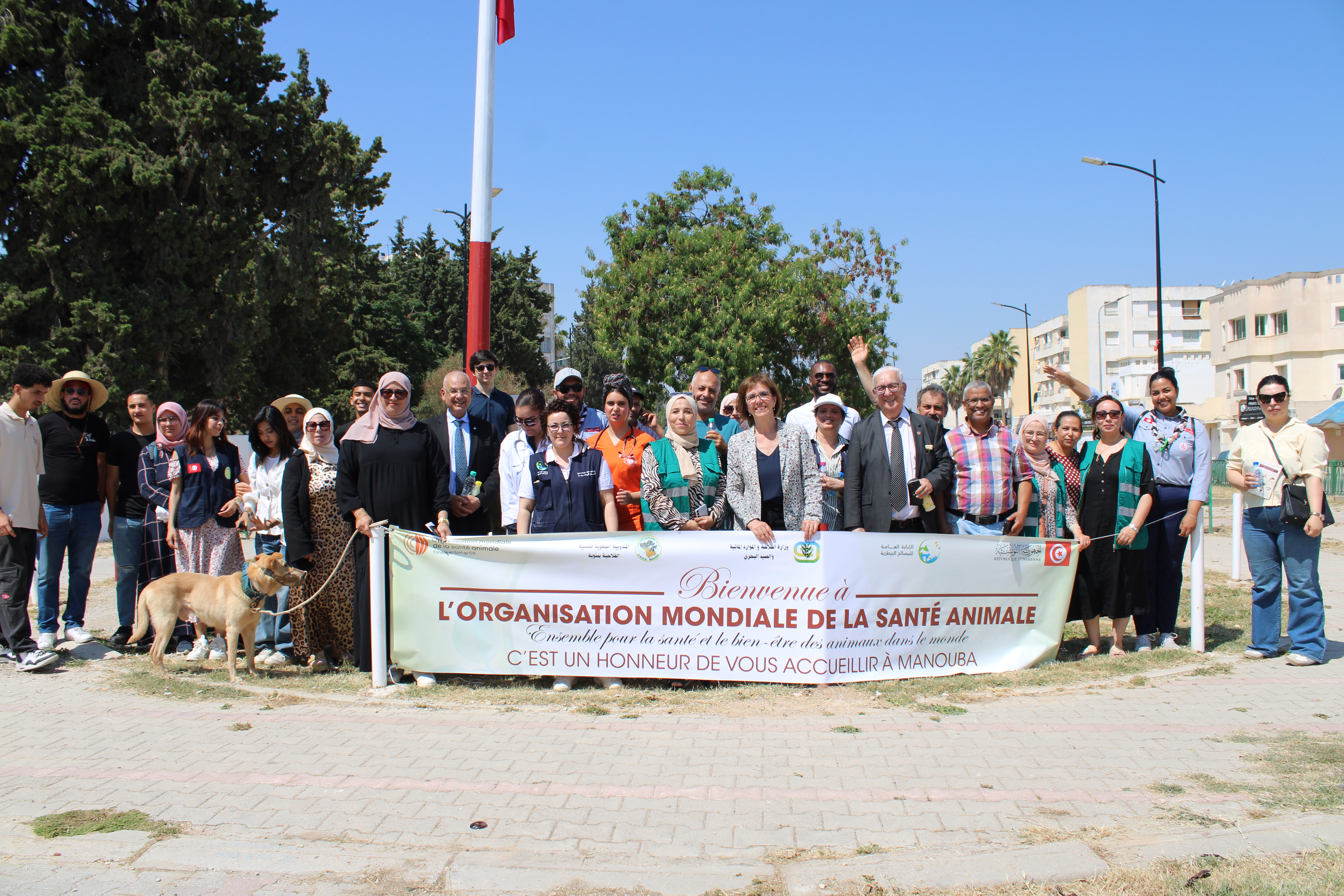WOAH Director General, Dr Emmanuelle Soubeyran, delivering her official keynote address at the Regional One Health Conference. Picture (c) N. Brik (woah) 2025.
On the sidelines of the Regional One Health Conference for the MENA region (Middle East and North Africa), co-organised by the World Bank and the Tunisian government in the capital Tunis from 14 – 15 June 2025, Dr Emmanuelle Soubeyran, Director General of the World Organisation for Animal Health (WOAH) conducted a series of significant field visits.
These visits reflect the Organisation’s strong commitment to supporting national Veterinary Services and their essential role in the practical implementation of the One Health approach.
A volunteer in the rabies vaccination tent engaging with Dr Emmanuelle Soubeyran. Picture (c) N. Brik (woah) 2025.
On 13 June, Dr Soubeyran began her day with a visit to the Tunis Racing Society, an emblematic institution involved in the breeding and promotion of Tunisian equine breeds such as the English Thoroughbred and the Berber or Barb Horse. The visit highlighted important topics such as equine health, genetic selection, and our collective animal heritage.
She then witnessed field activities focused on rabies awareness and vaccination campaigns, accompanied by public and private sector veterinarians, civil society actors, pet owners, and young volunteers engaged in combatting this disease, which remains present in some areas of the country. This experience demonstrated the tangible impact of collaboration across sectors and communities in preventing zoonoses.
Dr Soubeyran visiting a farm, accompanied by the officials from Tunis's VS (in green jackets) and WOAH staff. Picture (c) N. Brik (woah) 2025.
At a sheep farm, Dr Soubeyran witnessed a vaccination campaign against foot-and-mouth disease and sheep pox, underlining the vital role of animal health prevention in protecting farmers’ livelihoods and ensuring food security.
Dr Soubeyran also engaged in discussion with students and faculty at the National School of Veterinary Medicine in Sidi Thabet. Conversations focused on veterinary education, career prospects, and major public health issues, particularly antimicrobial resistance.
Dr Emmanuelle Soubeyran (second from left) with Dr Ayda Tletli (left), DG of the Tunisian Veterinary Research Institute (IRVT). Picture (c) N. Brik (woah) 2025.
The support of WOAH in education —through its standards, educational tools, and expert networks— was acknowledged as key to preparing future veterinarians.
During her visit to the Veterinary Research Institute of Tunisia (Institut de la Recherche Vétérinaire de Tunisie, IRVT), Dr Soubeyran toured the historic headquarters of this scientific institution and met with the virology laboratory team. The discussions highlighted Tunisian expertise in animal disease diagnostics and surveillance and opened doors to future technical collaboration.
The National Animal Health Surveillance Center (Centre national de Veille Zoosanitaire, CNVZ), a WOAH Collaborating Centre for “Continuing Education” and also for “Field Epidemiology”, welcomed the Director General for a meeting with its veterinarians and epidemiologists. Equipped with a continuously updated national data platform, harmonised surveillance protocols, and a multidisciplinary team, the CNVZ already plays a central role in early warning and outbreak response.
Discussions highlighted the Center’s national initiatives and its ambition to become a leading regional player in animal disease surveillance. The CNVZ also aims to expand its expertise and is working toward becoming a WOAH Collaborating Centre for “Animal Health Risk Assessment”. This strategic development complements the work of other WOAH Collaborating Centres, building a synergistic network in support of global animal health.
The day came to a close with a warm gathering with veterinarians from the Directorate General of Veterinary Services (DGSV), followed by an official meeting with H.E. Mr. Ezzeddine Ben Cheikh, Minister of Agriculture, Water Resources and Fisheries.
The day, rich in dialogue and discovery, showcased WOAH’s deep commitment, as embodied by its Director General, to the strengthening of Veterinary Services, promoting science for animal health, and advancing an integrated approach to global challenges. As Dr Soubeyran emphasized in her message published on LinkedIn : “the One Health approach takes on its full meaning when it is translated into concrete action on the ground-close to communities, professionals, and the real challenges they face every day”.
Dr Emmanuelle Soubeyran, WOAH Director General
WOAH Director General, Dr Emmanuelle Soubeyran, delivering her official keynote address at the Regional One Health Conference. Picture (c) N. Brik (woah) 2025.
On June 14–15, 2025, Tunisia hosted a high-level Regional One Health Conference, co-organised by the Tunisian government, the World Bank, and the four members of the Quadripartite: FAO, UNEP, WHO, and WOAH. This landmark event brought together nearly 400 participants from around the world, including ministers, technical experts, scientists, representatives of civil society, and international institutions. At the heart of the discussions were global health challenges that require joint action. Antimicrobial resistance, climate-related threats, zoonotic diseases, food security, environmental degradation, and the urgent need to strengthen integrated surveillance systems featured prominently throughout the dialogue.
Participants emphasised the importance of adopting a systemic, inclusive, and sustainable approach to addressing these complex issues.
More than just a member of the Quadripartite, the World Organisation for Animal Health has, for over a century, embodied a forward-looking vision focused on animal health as a pillar of global public health. In Tunis, this vision was expressed through a strong presence and a clear message: to make the One Health approach a concrete and lasting reality in the Middle East and North Africa region.
Dr Emmanuelle Soubeyran, Director General of WOAH, opened the Conference on behalf of the Organisation. In her speech, she reiterated the fundamental role of animal health within the One Health framework, highlighting WOAH’s unique expertise, its ability to unite multisectoral actors, and its commitment to building science-based strategies rooted in international solidarity.
She stressed the importance of strengthening national Veterinary Services, investing in detection, surveillance and response capacities, and reinforcing collaboration between the human, animal, and environmental health sectors. Her address also underscored WOAH’s commitment to supporting countries in implementing this integrated approach, closely aligned with local realities.







